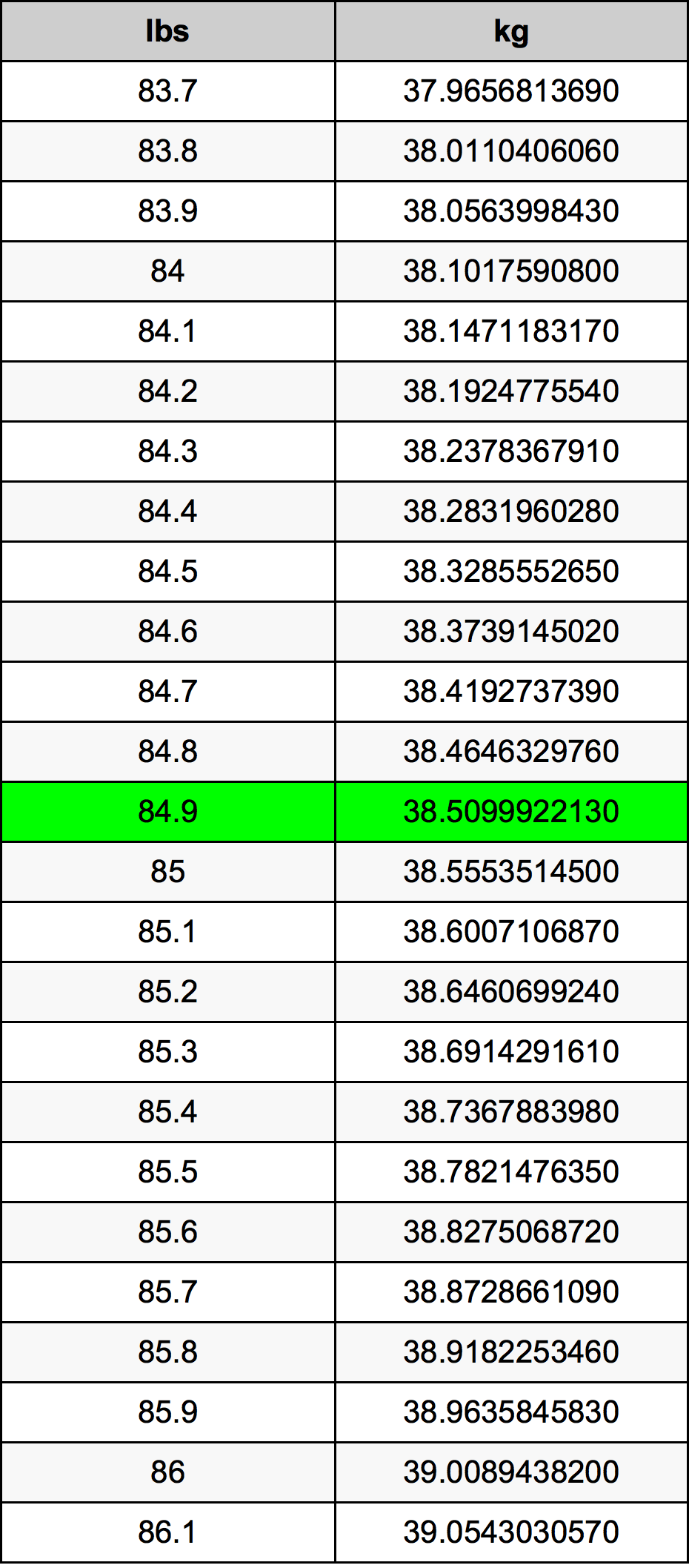Understanding The Conversion Of 84 Kg In Pounds: A Comprehensive Guide
In today's world, understanding weight conversions is essential, whether for health reasons, travel, or fitness goals. One common conversion that often comes up is between kilograms and pounds, particularly when discussing weight. For those who may not be familiar with these measurements, converting 84 kg in pounds can be a critical piece of information. This article aims to break down the conversion and provide context for its relevance. We will explore the implications of this weight in various scenarios, from personal health to everyday life.
Weight is a significant factor in numerous aspects of our lives, from determining body mass index (BMI) to setting weight goals for fitness. Understanding how to convert kilograms to pounds is not just about numbers; it can influence dietary choices, exercise regimens, and overall lifestyle changes. Therefore, knowing how to convert 84 kg in pounds is more than just a mathematical calculation—it is a step toward informed decisions.
Throughout this article, we will delve into the specifics of the conversion, the importance of weight management, and provide answers to common questions surrounding the topic. Whether you are a fitness enthusiast, someone keeping track of your health, or simply curious about weight conversions, this guide will serve as a valuable resource.
What is the Conversion Formula for Kilograms to Pounds?
To convert kilograms to pounds, you can use a simple formula. The conversion factor from kilograms to pounds is approximately 2.20462. So, to convert 84 kg in pounds, you would multiply 84 by 2.20462.
How to Convert 84 kg in Pounds?
Here’s the step-by-step breakdown of the conversion:
- Start with the weight in kilograms: 84 kg
- Use the conversion factor: 1 kg = 2.20462 pounds
- Multiply: 84 kg × 2.20462 = 185.19 pounds
Therefore, 84 kg is approximately equal to 185.19 pounds.
Why is Understanding Weight Conversion Important?
Understanding weight conversion is crucial for several reasons:
- Health Tracking: Many health metrics are based on pounds, especially in countries using the imperial system.
- Travel: When traveling, you may need to convert your weight for luggage limits, especially in airports.
- Fitness Goals: Weight loss or gain goals are often expressed in pounds, making it vital to know how your weight translates across systems.
What Are the Health Implications of Weighing 84 kg?
Weighing 84 kg can have various health implications depending on a person's height, body composition, and overall lifestyle. For example, to better understand the significance of weighing 84 kg, it’s essential to calculate the Body Mass Index (BMI).
How to Calculate BMI for 84 kg?
The BMI is calculated using the formula:
BMI = weight (kg) / (height (m) × height (m))
Assuming an average height of 1.80 m (about 5 feet 11 inches), the calculation for someone weighing 84 kg would be:
BMI = 84 / (1.80 × 1.80) ≈ 25.93
A BMI of 25.93 places an individual in the overweight category, which may prompt considerations for lifestyle changes.
What is the Ideal Weight Range for a Healthy Lifestyle?
The ideal weight range varies according to height and body composition. Here’s a quick reference for BMI categories:
- Underweight: BMI less than 18.5
- Normal weight: BMI 18.5 - 24.9
- Overweight: BMI 25 - 29.9
- Obesity: BMI 30 or greater
What Are the Benefits of Maintaining a Healthy Weight?
Maintaining a healthy weight can lead to numerous benefits, including:
- Reduced Risk of Chronic Diseases: Maintaining a healthy weight lowers the risk of conditions like heart disease, diabetes, and certain cancers.
- Improved Mobility: A healthy weight can enhance physical performance and mobility.
- Better Mental Health: Achieving weight goals can lead to improved self-esteem and mental well-being.
How Can One Achieve and Maintain a Healthy Weight?
Achieving a healthy weight involves a combination of:
- Balanced Diet: Eating a variety of foods, focusing on whole grains, fruits, vegetables, and lean proteins.
- Regular Exercise: Engaging in physical activities that elevate heart rate and build muscle.
- Staying Hydrated: Drinking plenty of water to maintain hydration and support metabolic processes.
What Role Do Genetics and Lifestyle Play in Weight?
Genetics can influence weight and body composition, but lifestyle choices play a crucial role. Factors such as diet, physical activity, and overall lifestyle habits can either help maintain a healthy weight or contribute to weight gain. Understanding these factors can guide individuals in making informed decisions about their health.
Conclusion: Understanding 84 kg in Pounds and Its Significance
Converting 84 kg in pounds is a straightforward process that holds significant implications for health and wellness. By understanding the conversion and its context, individuals can make informed decisions that impact their health, fitness, and overall lifestyle. Whether it's tracking weight for health reasons or understanding how it fits into daily life, this knowledge is invaluable.
In conclusion, whether you are looking to convert weight for personal reasons or simply curious about the conversion process, knowing that 84 kg translates to approximately 185.19 pounds is an essential piece of information. Embrace this knowledge as a step toward a healthier, more informed lifestyle.
Travel Comfort: Can You Carry A Blanket On An Airplane?
Exploring The Fascinating World Of MMG GF
Unveiling The Lives Of Sebastian Klein And Natalie Quinn


